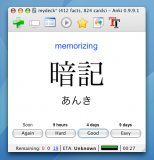Vlog: Nie trzeba mieć talentu, żeby nauczyć się języka
Wielu ludzi myśli, że musisz mieć talent żeby nauczyć się języka. Ale to nie prawda! Ktokolwiek może się uczyć jakiegokolwiek języka. Z mojego osobistego doświadczenia, tylko potrzebne są trzy składniki: czas, motywacja i efektywna metoda.
Obejrzyj ten filmik żeby dowiedzieć się więcej!
Czytaj transkrypcję poniżej!
The speed of language learning

How long does it take to learn a language? Well, it depends on how much time you spend learning and the effectiveness of your method.
But in my experience, I've noticed a pattern. Learning a language always follows the same pace over time: it starts out slowly, then moves very quickly and, finally, returns back to slowly again.
Read more for the details!
How to pick your first book to read in a foreign language
Reading and listening to books in a foreign language is a great way to learn the language. I learned Polish largely through reading and listening to Harry Potter.

It helps your brain learn to think in the language. Reading and listening to hundreds of hours of correct sentences will give you a sense of what "sounds right". You will be able to form correct sentences of your own by feel, not just grammar mathematics.
So, you'd like to give it a try. But what book should you choose?
Read more for advice on how to pick what to read in a foreign language.
What is spaced repetition?

Spaced repetition is a learning technique, that helps you learn and retain many facts over a long period of time.
Unless you have a photographic memory, you likely won't remember a fact you've seen just once. At least not for long! You will need to review that fact in order to keep it in your mind. But which facts should you review? And how often?
Read more to find out how spaced repetition answers these questions!
Vocabulary: The Biggest Challenge in Language Learning
All facets of language learning are important, including: reading, listening, speaking, grammar, pronunciation, etc. But vocabulary is the most important. Perfect grammar can't help you understand or speak if you don't know the words. On the other hand, if you get the grammar wrong but use the right words, you will probably still be understood.
Vocabulary is also the biggest challenge. There are only so many grammar rules. You will be reviewing those same rules over and over again, slowly strengthening your understanding of them the entire time you are learning a language. But the amount of vocabulary in a language is essentially infinite -- new words are coined every year.
Read more for advice on how to surmount this challenge!
You don't need to speak like a native speaker

In my article Let's stop saying "fluent!", I discussed the popular belief that being "fluent" means speaking just like a native speaker. Some people are obsessed with trying to speak like native speakers while others in the language learning community (like Cody of Codylanguagesblog) don't even think it's possible.
I don't want to say that it's impossible. Why should it be? If someone was motivated enough and worked really hard, I don't see why they couldn't reach that level. But, personally, I don't care about speaking like a native speaker.
Read more to find out why!
Let's stop saying "fluent"! ("fluently" and "fluency" too)
The word "fluent" is used to sell products, as well as, feed or crush egos. Since everyone has their own definition of the word, it's very hard (if not impossible) to have useful conversations about it, because we will be talking about different things. So, let's stop just stop using the word fluent!
Read more to learn about the discussion and see the alternative words I propose.
- « pierwsza
- ‹ poprzednia
- 1
- 2
- 3
- 4
- 5
- 6






